The Sound Level Meter Market is estimated to be valued at USD 12.6 billion in 2025 and is projected to reach USD 37.0 billion by 2035, registering a compound annual growth rate (CAGR) of 11.4% over the forecast period.
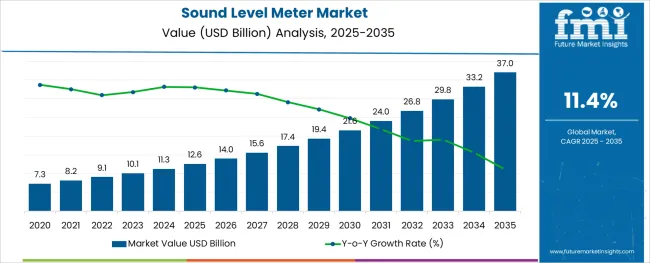
The sound level meter market is growing steadily due to increased awareness about noise pollution and stricter regulations for occupational and environmental safety. Various industries, especially construction, require accurate noise monitoring to ensure compliance with health and safety standards. The shift from analog to digital technologies has improved measurement precision and ease of data collection, supporting the growing demand for reliable monitoring tools.
Advances in device portability, user interfaces, and integration with data management systems have further accelerated adoption. Additionally, urbanization and infrastructure development projects are driving the need for continuous noise monitoring to minimize environmental impact.
The market outlook remains positive as governments and organizations intensify efforts to monitor and control noise levels. Segmental growth is expected to be led by digital sound level meters due to their accuracy and usability, and the construction industry as the primary end-use segment.
The market is segmented by Technology Type and End Use and region. By Technology Type, the market is divided into Digital Sound Level Meter and Analog Sound Level Meter. In terms of End Use, the market is classified into Construction, Aviation, Research, Defense, and Others. Regionally, the market is classified into North America, Latin America, Western Europe, Eastern Europe, Balkan & Baltic Countries, Russia & Belarus, Central Asia, East Asia, South Asia & Pacific, and the Middle East & Africa.
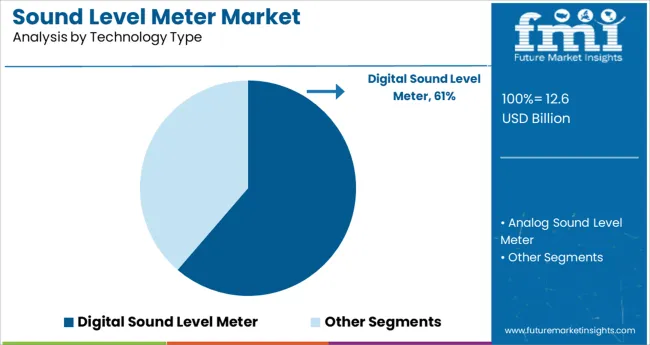
The digital sound level meter segment is expected to hold 61.3% of the market revenue in 2025, continuing its dominance in technology preference. Digital meters have become the standard because they offer precise readings, real-time data display, and easy calibration compared to analog models.
Their compatibility with software and wireless connectivity enables efficient noise data management and reporting. Users appreciate the portability and versatility of digital meters, which can be applied in various environments from construction sites to environmental monitoring.
The transition to digital technologies has been supported by increasing regulatory requirements for accurate noise measurement and data transparency. As demand for smart and connected devices grows, the digital sound level meter segment is poised to maintain its leading position.
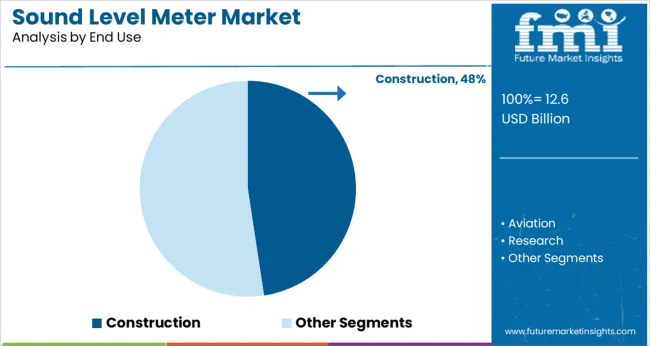
The construction segment is projected to account for 47.6% of the sound level meter market revenue in 2025, remaining the largest end-use sector. Noise monitoring in construction is critical to protect workers and nearby communities from excessive sound exposure.
Strict occupational safety laws require construction companies to regularly measure and manage noise levels to prevent hearing loss and comply with environmental standards. The rising scale and complexity of construction projects have increased the need for reliable and portable sound level meters to perform on-site assessments.
Additionally, urban development and infrastructure expansion have heightened concerns over noise pollution, making construction the leading application segment. With ongoing investments in infrastructure globally, the construction sector will continue to drive demand for sound level meters.
Increasing usage of sound level meters to monitor the acoustical performance of multiple structural elements of an office, a building, or air-conditioning and heat-ventilating systems in residential areas is expected to bolster the market. Governments of various countries are making the measurement of sound level a must to control the auditory and non-auditory effects of noise pollution in cities.
Moreover, ongoing development of new instruments by renowned companies featuring high precision is likely to accelerate the global sound level meter market growth in the upcoming decade. Surging usage of high-power speakers and woofers, as well as increasing number of jet planes and automotive is also projected to bode well for the global market.
Sound level meters are complex instruments that require skilled resources for conducting a thorough noise assessment. These are difficult to utilize in controlled environments, such as working at confined spaces and at heights.
Other sounds nearby, such as conversation with people, working operators, public announcement systems, and forklift rumbling can lead to the generation of inaccurate results.
Apart from that, when sound meters are used in a particular area, there are chances of a minimum disruption in terms of operational activities. Driven by the aforementioned limitations, demand for sound level meters may decline in the assessment period.
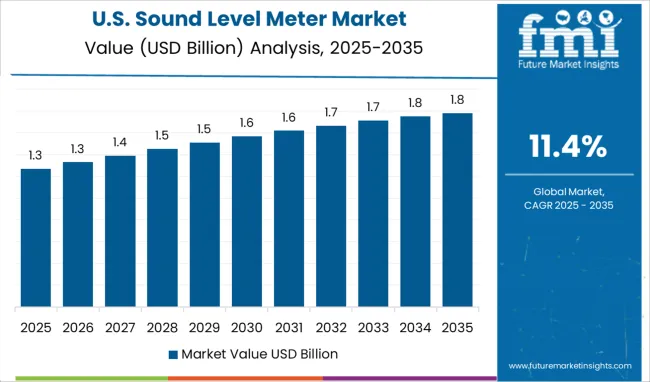
Presence of well-established power generation and aerospace & defense industries in the USA and Canada is anticipated to expand the North America sound level meter market share in the evaluation period. The USA government is also expected to take certain initiatives to continuously monitor sound levels at workplaces in the country.
In addition to that, sound level meters are gaining impetus in North America stoked by their ability to provide elaborate information about the source of noise. Rapid development of state-of-the-art instruments with features, such as LAeq & LCpeak results, noise map development, OHS claims management, and compliance with state OHS regulations is also estimated to propel the regional market.
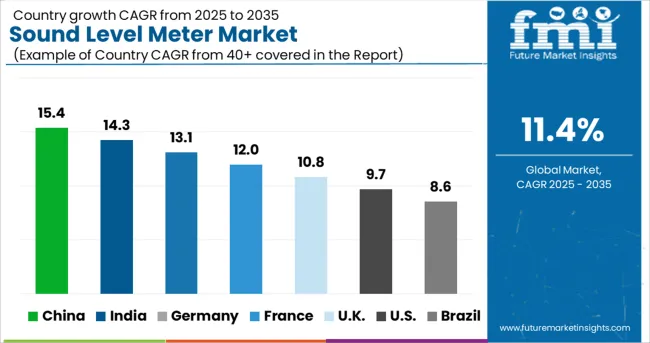
Rising insurgency against non-eco-friendly sound devices backed by the negative influence of high decibel noise on the environment is expected to push the Asia Pacific sound level meter market size in the forecast period. As per a report published by the National Library of Medicine, during 2001-2011, growth of the urban population surged to 31.8% in India.
It further mentions that the Central Pollution Control Board put forward phase I of the Real Time National Ambient Noise Monitoring Network covering 35 areas in seven metro cities. It has included ambient noise under the environmental quality parameter.
Nearly 160 areas spread over 25 cities will be established in phase II and phase III in 18 states. Thus, similar initiatives taken by the government are anticipated to positively impact the Asia Pacific market.
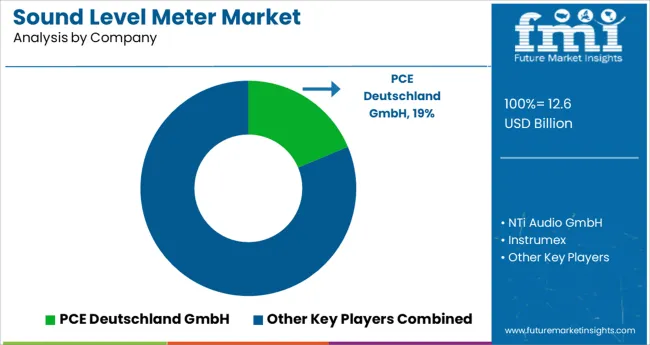
Some of the renowned companies present in the global sound level meter market include 3M, PCE Deutschland GmbH, HIOKI, NTi Audio GmbH, Testo, Instrumex, RION, Casella Inc., and SVANTEK among others.
The global market is highly fragmented with the presence of a large number of international and regional companies.The majority of the key players are increasingly focusing on mergers and acquisitions with start-up companies to broaden their product portfolios and distribution networks across the globe. Meanwhile, a few other key players are investing huge sums in research and development activities to come up with novel products for their customers.
| Report Attribute | Details |
|---|---|
| Growth Rate | CAGR of 11.4% from 2025 to 2035 |
| Base Year for Estimation | 2024 |
| Historical Data | 2020 to 2024 |
| Forecast Period | 2025 to 2035 |
| Quantitative Units | Revenue in million, Volume in Kilotons and CAGR from 2025-2035 |
| Report Coverage | Revenue Forecast, Volume Forecast, Company Ranking, Competitive Landscape, Growth Factors, Trends and Pricing Analysis |
| Segments Covered | Technology Type, End Use, Region |
| Regions Covered | North America; Latin America; Western Europe; Eastern Europe; APEJ; Japan; Middle East and Africa |
| Key Countries Profiled |
USA, Canada, Brazil, Argentina, Germany, UK, France, Spain, Italy, Nordics, BENELUX, Australia & New Zealand, China, India, ASEAN, GCC, South Africa |
| Key Companies Profiled |
3M; PCE Deutschland GmbH; HIOKI; NTi Audio GmbH; Testo; Instrumex; RION; Casella Inc.; SVANTEK |
| Customization | Available Upon Request |
The global sound level meter market is estimated to be valued at USD 12.6 billion in 2025.
It is projected to reach USD 37.0 billion by 2035.
The market is expected to grow at a 11.4% CAGR between 2025 and 2035.
The key product types are digital sound level meter and analog sound level meter.
construction segment is expected to dominate with a 47.6% industry share in 2025.






Our Research Products

The "Full Research Suite" delivers actionable market intel, deep dives on markets or technologies, so clients act faster, cut risk, and unlock growth.

The Leaderboard benchmarks and ranks top vendors, classifying them as Established Leaders, Leading Challengers, or Disruptors & Challengers.

Locates where complements amplify value and substitutes erode it, forecasting net impact by horizon

We deliver granular, decision-grade intel: market sizing, 5-year forecasts, pricing, adoption, usage, revenue, and operational KPIs—plus competitor tracking, regulation, and value chains—across 60 countries broadly.

Spot the shifts before they hit your P&L. We track inflection points, adoption curves, pricing moves, and ecosystem plays to show where demand is heading, why it is changing, and what to do next across high-growth markets and disruptive tech

Real-time reads of user behavior. We track shifting priorities, perceptions of today’s and next-gen services, and provider experience, then pace how fast tech moves from trial to adoption, blending buyer, consumer, and channel inputs with social signals (#WhySwitch, #UX).

Partner with our analyst team to build a custom report designed around your business priorities. From analysing market trends to assessing competitors or crafting bespoke datasets, we tailor insights to your needs.
Supplier Intelligence
Discovery & Profiling
Capacity & Footprint
Performance & Risk
Compliance & Governance
Commercial Readiness
Who Supplies Whom
Scorecards & Shortlists
Playbooks & Docs
Category Intelligence
Definition & Scope
Demand & Use Cases
Cost Drivers
Market Structure
Supply Chain Map
Trade & Policy
Operating Norms
Deliverables
Buyer Intelligence
Account Basics
Spend & Scope
Procurement Model
Vendor Requirements
Terms & Policies
Entry Strategy
Pain Points & Triggers
Outputs
Pricing Analysis
Benchmarks
Trends
Should-Cost
Indexation
Landed Cost
Commercial Terms
Deliverables
Brand Analysis
Positioning & Value Prop
Share & Presence
Customer Evidence
Go-to-Market
Digital & Reputation
Compliance & Trust
KPIs & Gaps
Outputs
Full Research Suite comprises of:
Market outlook & trends analysis
Interviews & case studies
Strategic recommendations
Vendor profiles & capabilities analysis
5-year forecasts
8 regions and 60+ country-level data splits
Market segment data splits
12 months of continuous data updates
DELIVERED AS:
PDF EXCEL ONLINE
Sound Level Measurement Meter Market Size and Share Forecast Outlook 2025 to 2035
Sound Meter Market Size and Share Forecast Outlook 2025 to 2035
Sound Intensity Microphone Market Size and Share Forecast Outlook 2025 to 2035
Level Floats Market Size and Share Forecast Outlook 2025 to 2035
Level Sensor Market Size and Share Forecast Outlook 2025 to 2035
Metering Pump Market Size and Share Forecast Outlook 2025 to 2035
Metered Dose Squeeze Dispenser Market Size and Share Forecast Outlook 2025 to 2035
Sound Barriers Market Size and Share Forecast Outlook 2025 to 2035
Soundproof Drywall Materials Market Size and Share Forecast Outlook 2025 to 2035
Sound Reinforcement Market Size and Share Forecast Outlook 2025 to 2035
The Metered Dose Inhalers Market is Segmented by Type, and End User from 2025 to 2035
Level Transmitter Market Growth – Trends & Forecast 2025 to 2035
Sound Sensor Market Analysis by Type, Technology, Specification, and Region Through 2035
Level Switches Market Growth - Trends & Forecast 2025 to 2035
Level Measuring Instrument Market
Cemetery Software Market Size and Share Forecast Outlook 2025 to 2035
Ammeters Market Size and Share Forecast Outlook 2025 to 2035
Diameter Signaling Market Size and Share Forecast Outlook 2025 to 2035
Odometer Market Trends – Growth & Forecast 2025 to 2035
pH Meter Market Growth – Trends & Forecast 2019-2027

Thank you!
You will receive an email from our Business Development Manager. Please be sure to check your SPAM/JUNK folder too.
Chat With
MaRIA